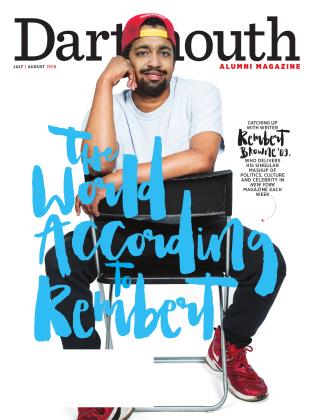LOOK WHO’S TALKING
JASON SORENS, Libertarian activist and government lecturer
JULY | AUGUST 2016 Lisa FurlongJASON SORENS, Libertarian activist and government lecturer
JULY | AUGUST 2016 Lisa FurlongLOOK WHO’S TALKING
JASON SORENS, Libertarian activist and government lecturer
^Ê^k “The federal role in education should be much less.”
Fifteen years ago you wrote an essay calling for 20,000 libertarians to move to a small state where they could promote libertarian policies. How did you envision your Free State Project working?
I was 24. I didn’t know what to expect. I knew if we could get 20,000 people—about half of Libertarian Party members in the country at the time and, in the case of New Hampshire, about 1.5 percent of the population—we would have enough people to expand civil liberties. I had no idea what that would look like in the flesh.
Why did Free Staters favor New Hampshire over Wyoming, which your members also considered?
We liked the state’s unique mix of public policies. It’s fiscally conservative but socially moderate, with a low tax burden and not a lot of restrictions on people’s private lives. I liked that it has a lot of universities and colleges where I might be able to work.
Are your students aware of the project?
I don’t know how much they know coming into the classroom. I teach my classes in a very pluralistic way. I like to have lots of different viewpoints and robust discussions.
Now that you’ve met your goal of 20,000 members who say they will move to New Hampshire, some of the roughly 2,000 already here have been in the news: the “Robin Hooders” who feed parking meters in Keene, for example.
There are different factions. Some are more oriented toward civil disobedience, some toward electoral politics. Right now I think we have 15 Republicans and three Democrats in the legislature, but there’s a larger libertarian caucus: About 80 to 100 legislators will vote a libertarian position 85 percent of the time.
Where do you draw a line when it comes to civil disobedience?
You have to take into account the interests of others around you. Disobeying an unjust law is not necessarily wrong, but it can be wrong if you’re harming yourself or others. Not everything that should be legal is morally permissible. It’s important for people to support a moral ecology that promotes good decision-making.
Lisa Furlong
To read an extended interview, visit the DAM website.
 View Full Issue
View Full Issue
More From This Issue
-
 COVER STORY
COVER STORYThe World According To Rembert
July | August 2016 By Jennifer Wulff ’96 -
 FEATURE
FEATUREThe Fixer
July | August 2016 By Matthew Mosk ’92 -
 FEATURE
FEATUREPhoto Finish
July | August 2016 By LISA FURLONG -
 PERSONAL HISTORY
PERSONAL HISTORYReel Oddity
July | August 2016 By TOM ROPELEWSKI -
 TECHNOLOGY
TECHNOLOGYA Monitored State
July | August 2016 By JUDITH HERTOG -
 RETROSPECTIVE
RETROSPECTIVE“Don’t Join the Book Burners”
July | August 2016 By RICHARD C. CAHN ’53
Lisa Furlong
-
 Article
ArticleShe’s a Keeper
MARCH | APRIL 2014 By Lisa Furlong -
 CONTINUING ED
CONTINUING EDKelvin Chin ’73
SEPTEMBER | OCTOBER 2016 By LISA FURLONG -
 CONTINUING ED
CONTINUING EDAnn Fromholz ’90
MARCH | APRIL 2018 By LISA FURLONG -
 CONTINUING ED
CONTINUING EDDavid Shribman ’76
SEPTEMBER | OCTOBER 2018 By LISA FURLONG -
 CONTINUING ED
CONTINUING EDNiko Lalos '20
MAY | JUNE 2021 By LISA FURLONG -
 CONTINUING ED
CONTINUING EDEugene F. “Buddy” Teevens III ’79
SEPTEMBER | OCTOBER 2022 By LISA FURLONG
Notebook
-
 notebook
notebookPEOPLE IN THE NEWS
MARCH | APRIL 2017 -
 notebook
notebookNEWS AND NOTES
JULY | AUGUST 2017 -
 notebook
notebookTHE FUTURE: "This Is My Vision”
NOVEMBER | DECEMBER 2023 -
 notebook
notebookTrue Believers
MAY | JUNE 2019 By GEORGE M. SPENCER -
 notebook
notebookComputer Graphics
NOVEMBER | DECEMBER 2017 By Ishaan H. Jajodia ’20 -
 notebook
notebookA Photographer’s Life and Times
JULY | AUGUST 2023 By Sean Plottner

